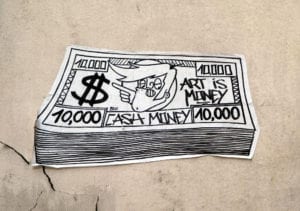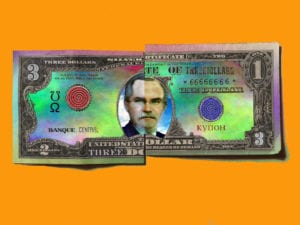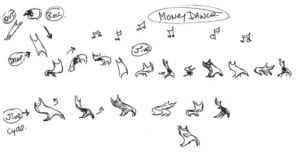May 7, 2020 | By Jeff Cook
One Person’s Take on
Financial Literacy for the Artist
. . .

I have been a professional musician for most of my working life and my family, including my mother who has long since passed away, has relied on virtually all of the different arts for income, in whole or in part — as do most artists seeking monetary rewards for our efforts.
I’ve always been interested in how the world of finance worked, first because I thought I would be an economics major in college and then because I found that so much of the world — including the arts — was inextricably linked with, and influenced by, how people thought about money.
An additional benefit was to figure out how to live on what I was earning.
Think about the current, very heated political/economic arguments of today involving capitalism and socialism, which will ultimately have a huge effect on our economic lives going forward. We continue to be consumed, or should be, by how great the gap is between the 1% and the rest of us, ESPECIALLY those of us in the arts.
We would like to pursue “artistic” activities that we feel are beneficial to society — and be fairly compensated for the work that we produce.
As I progressed through my life of music, I found that the rest of the world didn’t think about the writer, painter, actor, singer, etc. in the same fond economic terms as I thought they did:
“Yes, but we shouldn’t have to pay you so much(!) because you enjoy what you do!” — arts organization board member.
“You can’t take that expense deduction because the government thinks your work is a hobby” — more than one IRS employee.
“That must be really rewarding… But what’s your day job?” — casual acquaintance at a party.
“Can you live on that???? — spoken by a non-artist

After completing all the requirements to become a Certified Financial Planner, I found that I still preferred to continue my life in music full-time — but now I was a little more intellectually armed for the battle.
I have given planning seminars from “savings and investment” to “taxes for conductors and singers” and “consumption-income smoothing.” I have also, in my darker moments, referred to personal financial planning as a war… with YOU, the ARTIST, against the rest of the economic world.
I found that a large portion of my artistic colleagues have very ambivalent feelings about learning to wield the weapons of financial war. Sometimes they say “it’s just not being artistic” or “I’m not good at math” or “what’s the point?… I really don’t have any assets to save or invest.”
I would like to humbly suggest that taking a small part of your all-consuming artistic life to bone up on any financial skills, math, vocabulary, that you find lacking or confusing — and doing so on a regular basis — will reap great rewards.
Since we all have been sheltering at home these many weeks and will probably continue to do so in the near future, perhaps when the mood strikes, think about why and how you might want to refinance your house now, or learn how credit scores are REALLY computed, or “will I really have enough for my later years, as artists really don’t RETIRE?”
“AGGGGGGGGGGGGHHHH”
I know, but one of the few real financial benefits that have occurred since this crisis is the complete collapse of interest rates around the world. That’s gotta be good for somebody (not CD buyers though) and maybe that’s you.
Are credit card cards charging less? (and why not?). You might be able to borrow at negligible rates if you have a good FICO score… but what’s that? (and do I have one ?) — and how come it seems to affect such a large part of my life?… and so on?????
There is no doubt that this a very, very scary and dangerous time for all of us. Our president has said that he is a wartime president. Our health is at risk, our savings and retirement are at risk, our private and governmental arts organizations are at risk etc, etc, etc.
Yet it is important to believe that things will eventually get better and as that happens, the economic world will also recover. It is important that the ARTIST is ready to take advantage of the many changes — and that can only happen by understanding and engaging the “enemy” from a position built from information, knowledge and confidence.

There is an incredible amount of good information out there on the internet but you have to be very careful in confronting your gaps in financial knowledge and getting sucked in by advertising and propaganda.
Start at home with collecting your personal and family financial info and asking yourself if you can do a better job with the assets you already have. If not, why?
That will raise all sorts of new questions which will lead to more questions with answers and hopefully to the beginning of confidence and the feeling that you are gaining some control.
Yes, there is a plethora of financial advisers and planners out there. And if you are very lucky, you might find one who understands your particular issues as an artist, probably with you being self-employed or an independent contractor with “lumpy” (erratic and seasonal) income, many smaller jobs and with little savings and nagging debt issues — and possibly with regular bouts of unemployment. I wish you the best of luck.
But……
I know that most people with the skills and intelligence of an artist CAN begin the process of going way beyond the onerous process of yearly tax preparation and decide to create their personal plans for savings, investing, emergency funds, and dealing with debt and credit like a pro.
There is an old saying that “no one cares more about your money than YOU do.” It takes that commitment to say, “I can do this… It’s not rocket science.”

Finding More Information
I should begin this section with the disclosure that everything here is only my opinion, with all my biases including the bit about arming for a “financial war.”
My goal is to encourage you, through education and information, to form YOUR OWN opinions and biases. If there is one portion of the economy that is more filled with jargon, hyperbole, misinformation and many other misleading techniques of persuasion, it is the area of money and finance. It is constantly exhorting you to BUY, BUY, BUY and uses terms and phrases to encourage action without using your common sense, knowledge and due diligence.
And with all the well-meaning politicians’ attempts to explain, clarify and prevent evildoers from scamming you, with few exceptions, these efforts only make it worse. Think of the many pages you have to sign (and read?) when completing any real estate transaction. Nobody said life was easy!
Collect, over time, all the information that you can and rather than throwing up your hands, move forward with caution, an open mind — and a grain of salt.

In my lifetime of searching the libraries, internet and seminars for honest, intelligent and intelligible financial information, I find that in general, somebody wants to sell a product or information (that’s OK) and many times the information is new to me, helpful and reasonably priced (free). In other cases, it isn’t but I can know that only after the experience and cost. Free information can be great but then you may only get what you pay for, good or bad.
Start with known quantities that have little or no risk. There are many good books in the public libraries, the only problem being that they’ve become outdated regarding tax laws, savings and investment techniques. The financial fads of an earlier era have changed in this digital age and especially with big changes in interest rates.
I used to haunt the Barnes and Noble Bookstore’s Financial aisles for diverse and up to date information. One of my favorites from many years ago was You Can Retire Early Investing with Government Guaranteed CD’s! (interest rates were 8% back then, so do not try to do this at home now unless you are a multimillionaire.)
After you make a list of all the words you don’t understand, you can go to wikipedia.org and investopedia.com. Once you start, you can go down the proverbial rabbit hole with many new ideas to research.
I find information on debt, credit, interest rates and bonds both important and confusing because of the jargon used, and lots of counterintuitive concepts. Your credit score, FICO, is one of your more important life numbers after Social Security — and you will find that you don’t have ONE, you have at least THREE!
These numbers affect what and where you can borrow, your insurance rates, your job applications and a whole lot else. creditkarma.com is worth checking for a lot of debt-related information, but you’ll see that they make their money trying to hook you up with the latest, greatest, most-rewards credit cards.

With the internet, always try to figure out how the company actually makes its profit.
You might enjoy looking up the 2020 TIAA Institute-GFLEC Personal Finance Index to see how you do on their questionnaire. TIAA is the huge insurance company that has been providing IRA’s for educators for many years.
Many of the books and online writings on financial literacy — especially for young people and women — by Carrie Schwab Pomerantz, daughter of the eponymous broker, are well informed, current and interesting. The murky area of student loans is covered in her Ask Carrie in the Schwab magazine available free from the broker.
Other good places to start looking for information are from large internet brokerages like fidelity.com and schwab.com. They are still trying to sell you their services, but they are reputable and have loads of free information. Anything to do with savings and investment like Individual Retirement Accounts are thoroughly covered, and in general their representatives are friendly and knowledgeable.
If you are considering getting professional advice for your financial questions, you can investigate what a Certified Financial Planner, might offer — but remember they want you to have some assets that they can invest for you, along with other services you may or may not need. Ask how they charge for their services, fees and commissions, and be sure that you are prepared to interview THEM (at least 2 or 3). Because you’ve already done a lot of research, right?
I hope, in this time of extreme stress in many areas of your life, that I have given you some ideas about how to start to gain some control over at least one of them.
I could quote the old Chinese proverb about taking the first step of a long journey — but as an artist, I’m sure you already know it.
May you have a long and profitable trip.


